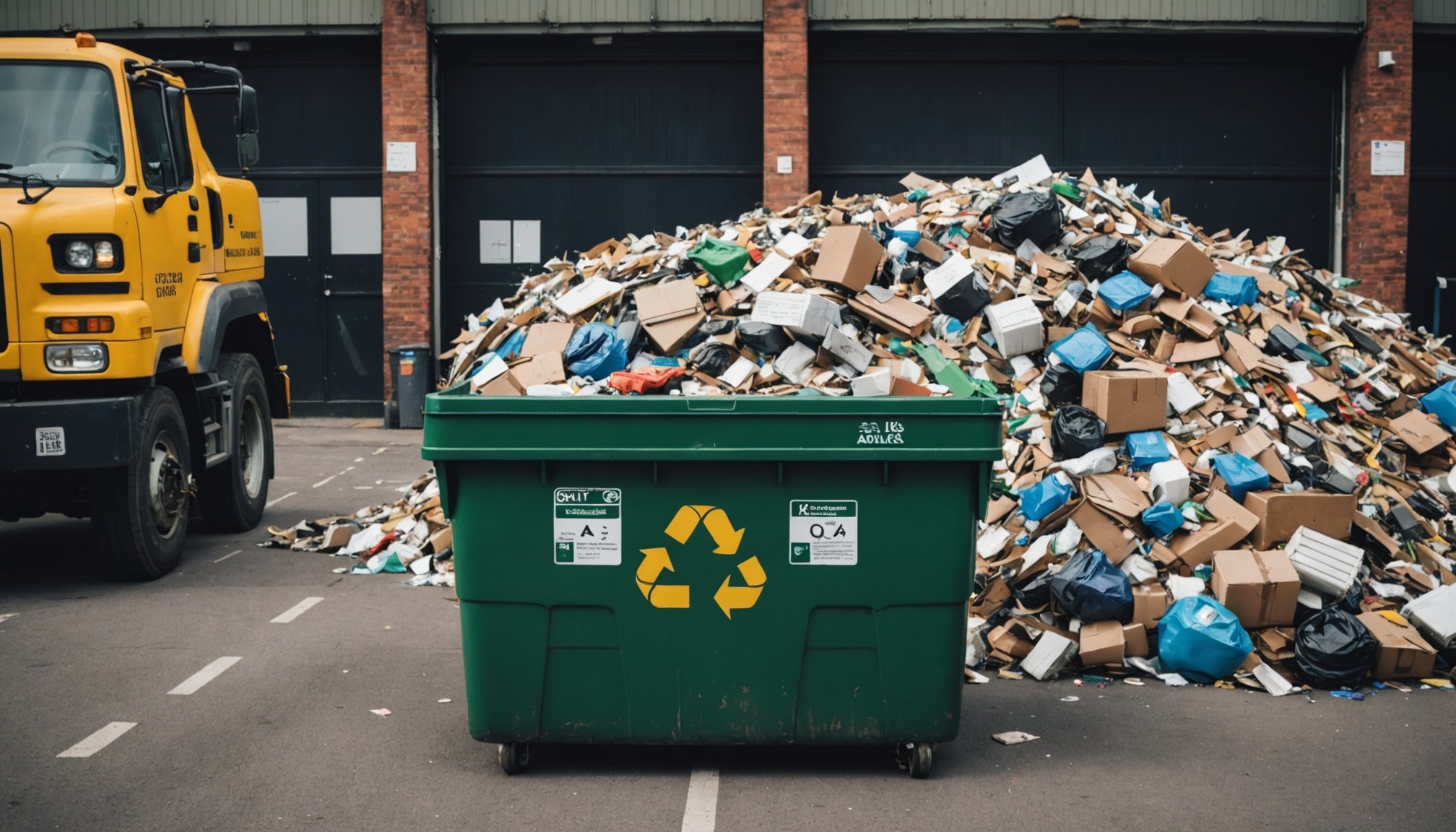Your Essential Handbook to UK Waste Management Compliance: A Navigational Guide for Recycling Startups
Understanding the UK’s Waste Management Landscape
The UK is undergoing a significant transformation in its approach to waste management, driven by the urgent need to reduce environmental impact and achieve a circular economy. For recycling startups, navigating this landscape can be complex, but understanding the key components and regulations is crucial for success.
The Circular Economy Vision
The UK government is committed to transitioning to a circular economy, a model that aims to reduce waste to a minimum and ensure that resources are used efficiently. This vision is supported by several major reforms, including the Extended Producer Responsibility (EPR) scheme for packaging, Simpler Recycling, and a Deposit Return Scheme (DRS) for drinks containers[2][4].
In the same genre : Critical cybersecurity tactics for uk firms: protecting your business in the digital age
Key Reforms and Regulations
To comply with UK waste management regulations, startups need to be aware of the following key reforms:
Extended Producer Responsibility (EPR) for Packaging
EPR places the responsibility for the waste generated by a product on the producer. This means that companies will have to pay for the waste management of their packaging, incentivizing them to design more sustainable and recyclable packaging. Landbell Group, a leading provider of EPR services, helps companies navigate these obligations globally, including in the UK[3].
This might interest you : Discover dynamic english classes online for all ages
Simpler Recycling
Simpler Recycling aims to standardize recycling practices across England, making it easier for people to recycle the same materials consistently. This reform will simplify the recycling process, increase recycling rates, and support investment in domestic reprocessing facilities. For startups, this means ensuring that their products and packaging are designed to be recyclable under these new standards[2].
Deposit Return Scheme (DRS) for Drinks Containers
The DRS will require consumers to pay a deposit on certain drinks containers, which can be refunded when the container is returned. This scheme is designed to increase recycling rates for these containers and reduce litter. Startups in the food and beverage sector need to consider how this scheme will affect their packaging and supply chain[2][4].
Innovations in Waste Management and Recycling
Several startups are at the forefront of innovation in waste management and recycling, offering solutions that align with the UK’s circular economy goals.
Greyparrot: AI in Waste Sorting
Greyparrot, based in Bristol, uses artificial intelligence to analyze waste streams in sorting facilities. Their technology helps companies redesign packaging to improve recycling rates. With corporate investors like Bollegraaf and Amcor, Greyparrot is a prime example of how technology can enhance waste management[1].
Kelpi: Bioplastic Packaging
Kelpi, another Bristol-based startup, creates bioplastic packaging from seaweed. This material is compostable at home and leaves no toxins, making it an attractive alternative to traditional plastics. Kelpi has secured significant funding and partnerships with major companies like L’Oréal and Diageo[1].
Ecovative: Mycelium-Based Packaging
Ecovative, a US-based startup with global operations, produces compostable packaging made from mycelium. Their products mimic Styrofoam but fully compost in 45 days. With significant funding from investors like Viking Global Investors, Ecovative is expanding its production to meet growing demand from companies in various sectors[1].
Practical Steps for Your Business
To ensure your recycling startup complies with UK waste management regulations and contributes to the circular economy, here are some practical steps to take:
Design for Sustainability
- Use Biodegradable Materials: Consider using biodegradable materials like seaweed or mycelium for your packaging.
- Optimize Packaging Design: Ensure your packaging is designed to be recyclable and minimize waste. Greyparrot’s AI technology can help in this process[1].
Implement Efficient Waste Collection
- Collaborate with Local Authorities: Work with local authorities to ensure your waste collection processes align with the Simpler Recycling reforms.
- Use Digital Solutions: Utilize digital solutions like those offered by Landbell Group to manage waste and recycling efficiently[3].
Educate Consumers
- Clear Labeling: Use clear labeling and QR codes to inform consumers how to recycle your products. CIRT Check’s consumer-facing app is a good example of this approach[1].
- Awareness Campaigns: Participate in awareness campaigns to educate consumers about the importance of recycling and proper waste disposal.
Financial and Regulatory Compliance
Compliance with UK waste management regulations also involves financial and regulatory aspects.
Funding and Investment
- Secure Funding: Many startups in the waste management sector have secured significant funding from venture capital firms and corporate investors. For example, Kelpi and Ecovative have raised substantial amounts to scale their operations[1].
- Government Incentives: The UK government is investing heavily in recycling infrastructure, with plans to stimulate over £10 billion in investment in recycling capability over the next decade[4].
Regulatory Support
- Extended Producer Responsibility: Companies like Landbell Group provide comprehensive services to help businesses comply with EPR regulations. This includes advocacy, lobbying, and project delivery across the globe[3].
- Compliance Software: Utilize software solutions offered by companies like Landbell to manage compliance, waste, and resources efficiently.
Table: Key Reforms and Their Impact
| Reform | Description | Impact |
|---|---|---|
| Extended Producer Responsibility (EPR) | Producers pay for the waste management of their packaging. | Incentivizes sustainable packaging design; increases recycling rates. |
| Simpler Recycling | Standardizes recycling practices across England. | Simplifies recycling for consumers; increases recycling rates. |
| Deposit Return Scheme (DRS) | Requires a deposit on certain drinks containers. | Increases recycling rates for drinks containers; reduces litter. |
List: Actions for Startups to Comply with UK Waste Management Regulations
-
Conduct Research: Stay updated on the latest regulations and innovations in waste management.
-
Follow government announcements and policy changes.
-
Engage with industry reports and research papers.
-
Design Sustainable Products:
-
Use biodegradable materials.
-
Optimize packaging design for recyclability.
-
Implement Efficient Waste Collection:
-
Collaborate with local authorities.
-
Use digital solutions for waste management.
-
Educate Consumers:
-
Use clear labeling and QR codes.
-
Participate in awareness campaigns.
-
Ensure Financial and Regulatory Compliance:
-
Secure funding from investors.
-
Use compliance services and software.
Quotes from Key Figures
-
Circular Economy Minister Mary Creagh: “Electrical equipment like vapes are being sold in the UK by producers who are failing to pay their fair share when recycling and reusing or dealing with old or broken items. Today we’re ending this: creating a level playing field for all producers of electronics, to ensure fairness and fund the cost of the treatment of waste electricals.”[4]
-
Landbell Group: “We want to show clients how to design more eco-friendly goods and packaging, and to use cleaner chemicals. We want to keep on developing the solutions and technologies that strip costs and complexity from EPR, as well as helping governments and companies achieve their environmental goals.”[3]
Navigating the UK’s waste management landscape as a recycling startup requires a deep understanding of the regulatory environment, innovative technologies, and practical compliance steps. By designing sustainable products, implementing efficient waste collection, educating consumers, and ensuring financial and regulatory compliance, startups can not only comply with regulations but also contribute significantly to the UK’s transition to a circular economy.
As the UK continues to crack down on waste and promote sustainable practices, the opportunities for innovative startups are vast. By leveraging technologies like AI in waste sorting, bioplastic packaging, and mycelium-based materials, startups can play a key role in reducing the environmental impact of waste and promoting sustainable development.
In the words of Circular Economy Minister Mary Creagh, “We are helping UK businesses compete and grow, and we continue to get more households recycling, cracking down on waste and ending the throwaway society.”[4] By following this handbook, your startup can be at the forefront of this transformation, contributing to a more sustainable future for all.











